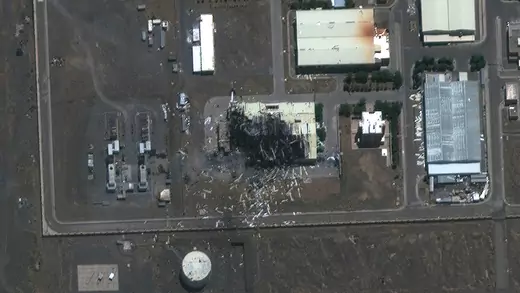 An explosion has caused heavy damage to an Iranian nuclear facility just as the country approaches a bold new energy partnership with China, but Iran shows no signs of slowing down its nuclear program.
An explosion has caused heavy damage to an Iranian nuclear facility just as the country approaches a bold new energy partnership with China, but Iran shows no signs of slowing down its nuclear program.
What happened at the Natanz nuclear plant earlier this month?
A satellite image shows a close-up view of a building damaged by fire at the Natanz nuclear facility in Iran. Maxar Technologies/Reuters
It appears that a huge explosion occurred at the plant, specifically at a warehouse used to construct advanced centrifuges. Iran had hoped to roll out a large number of such machines to boost its uranium enrichment capacity. The U.S. press has speculated that Israel was responsible. In the past few months, there have been various accidents at Iran’s military facilities, including at a missile production factory.
Amid widespread speculation of sabotage, Iranian leaders have not confirmed the cause of the explosion, but they say it will likely lead to delays in developing advanced centrifuges. In his report to parliament, Ali Akbar Salehi, head of the Atomic Energy Organization, said “expert groups from various security and intelligence departments have investigated this issue and the Supreme National Security Council has identified the cause of the accident, but the results have not yet been announced because of security concerns.”
How damaging is this for the nuclear program?
The most recent estimates suggest that the attack will delay by as much as two years Iran’s ability to bring online thousands of advanced centrifuges that were being assembled. Natanz was the main center for the mass production of various centrifuges, but it was not the only manufacturer of advanced ones. The most advanced model under development, known as IR-8, is being designed at Kalaye Electric Company in Tehran.
The World This Week
A weekly digest of the latest from CFR on the biggest foreign policy stories of the week, featuring briefs, opinions, and explainers. Every Friday.
Iran is determined to develop a sophisticated nuclear apparatus and advanced centrifuges are the core of such a program. Iranian officials have repeatedly said the nuclear program is for civilian energy purposes only, but U.S. officials suspect the country is developing a military capability. Despite delays caused by such incidents, the program will continue to move forward, but for now at a diminished pace. Iran is also likely to take further measures to protect its installations because recent incidents point to serious security gaps.
Iran has been resuming nuclear activities since the United States pulled out of the nuclear deal, known as the JCPOA. Is that deal effectively dead?
Since the United States left the JCPOA in May 2018, Iran has breached multiple terms of the agreement. It has enriched uranium beyond the permitted level, refused to ship out its enriched uranium, accelerated research and development of advanced centrifuges, and denied the International Atomic Energy Agency (IAEA) access to two facilities. Still, the JCPOA is not quite dead.
Thus far, Iran and other members of the JCPOA, including China, France, Germany, Russia, and the United Kingdom, seem to want to keep the deal alive. They still see it as a basic framework for arms control. They also hope that if former Vice President Joe Biden is elected U.S. president, he will return to the deal as he has pledged and Iran will come back to compliance. Still, reviving the deal would be tough; Iran is adamant it will not renegotiate any aspect of the deal because it says the United States is the offending party for leaving the agreement and then imposing sanctions on Iran. The Donald J. Trump administration left the deal in part, it said, because the deal rewarded Iran for ongoing aggressive behavior, including support for the Syrian regime and the rebel Houthis in Yemen.
China is reportedly poised to sign energy deals with Iran that would bring the two closer economically. What could this mean?
The agreement calls for an extraordinary degree of cooperation between the two countries, according to a leaked version of the eighteen-page draft, known as the Iran-China Twenty-Five-Year Comprehensive Partnership Document. Iran pledges to provide China with crude oil at a mutually agreed upon price, opening the possibility of selling at discounted rates. In addition, China will become a major player in developing Iran’s oil, natural gas, and petrochemical facilities. Beyond petroleum, China will be active in many aspects of Iran’s economy, such as agriculture, banking, infrastructure, and telecommunications. The draft agreement also calls for closer military ties. If finalized, the deal would bind Iran to a foreign power in an unprecedented way.
It is important to note that the draft agreement is still aspirational. But if all this comes to fruition, it will signal that the Iranian government has given up President Hassan Rouhani’s longtime aims to rejuvenate Iran’s economy by relying on Western investments and trade. However, the notion of being tied to a single power for a prolonged period of time does not sit well with many in Iran.
No comments:
Post a Comment